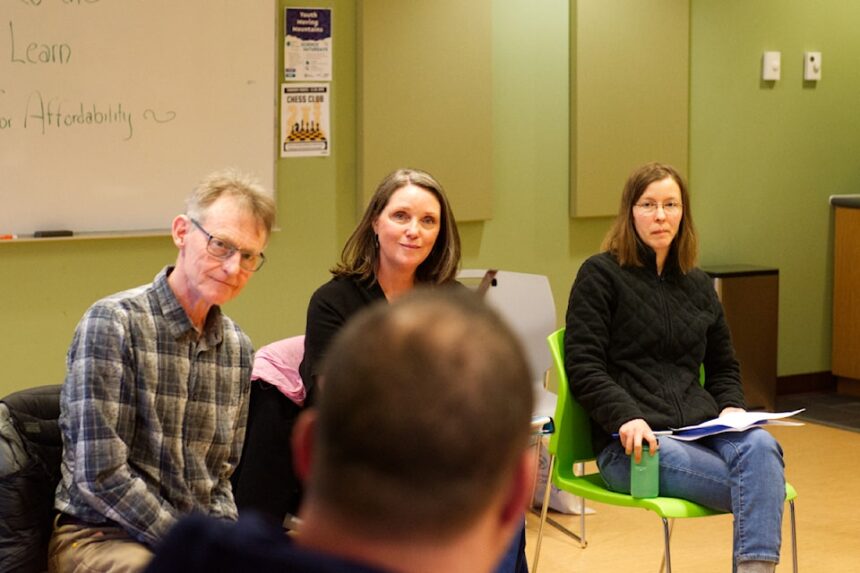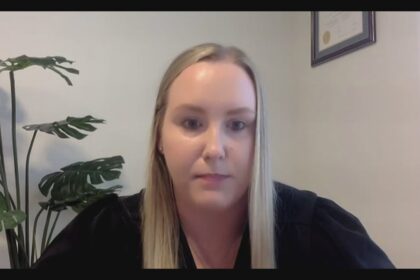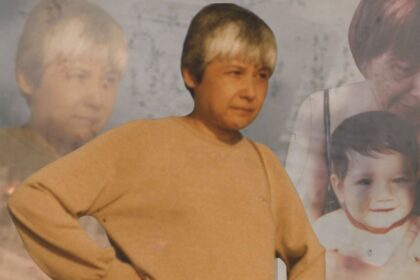The Yukon Anti-Poverty Coalition held the event at the Whitehorse Public Library on April 10 Three of the four Yukon candidates seeking the MP seat in the coming election spent their lunch talking with community members about affordability at the Whitehorse Public Library on April 10. The event was hosted by the Yukon Anti-Poverty Coalition, and allowed attendees to pose questions of the candidates on homelessness, food insecurity, mental health, and opioid addiction, among other issues. Brendan Hanley, the Liberal candidate, Katherine McCallum, the NDP candidate and Gabrielle Dupont, the Green candidate, were all present at the event. Conservative candidate Ryan Leef was absent. YAPC project coordinator Keitha Clark said the organization is still awaiting Leef’s response to the questions posed. Housing got a great deal of attention from the candidates. Katherine McCallum, of the NDP, said that both of her two adult children still live at home because they cannot afford to move out. She said that while they are able to stay with their family, that is not an option available to everyone. The NDP has a plans for a “massive public infrastructure-building program to build 100,000 government-owned affordable rental units on public lands,” said McCallum. “And, we would also ensure that tenants can stay in their homes by bringing in a national Tenants’ Bill of Rights to end big hikes, big rental hikes, renovictions, demovictions and other unfair practices.” Gabrielle Dupont, of the Green Party, pointed to her party’s platform of funding more social housing. Dupont, who said she works with the building industry, said it is important to “look at championing the industry for them to build affordable housing for us.” Hanley said the Liberal Party, if elected, would commit to building 500,000 new homes across the country every year. He compared the effort to increase supply to the post-World War Two housing drive which led to the development of certain neighbourhoods across Whitehorse, like Takhini and Valleyview. Hanley said having housing and cost of living intersects with supporting food security in the territory. If families can manage costs, then they can afford their groceries, he said, in response to a question about reducing the demand on the Whitehorse Food Bank. Food sovereignty and food autonomy are potential solutions, said Hanley. He said we should look at how to increase food production locally. Organizations with these goals should receive federal support, and many already are, said Hanley. “We need to look for those supports through organizations for food sovereignty, food autonomy, while addressing the, all of the global aspects that make life more affordable again, keeping the programs such as affordable childcare in place to offset the expenses that families are facing,” said Hanley. Despite there being no need for food banks in an ideal world, said Dupont, there will always be people in emergencies who will need to rely on the food bank. “You guys have pitiful resources, and I really, really would like to see the food bank properly funded,” said Dupont. She said she had the sense the food bank was in perpetual crisis in terms of meeting the needs of the community with limited resources, and that the solution was to ensure the food bank is properly funded. McCallum said she raised her family as a single mother, and sometimes still had trouble affording groceries. “That’s undignified and demeaning and hard,” said McCallum. “Nobody deserves to struggle like that.” She said the government has a responsibility to make sure that no one in Canada goes hungry. “It should just be a given, and that starts by treating food like it’s right, not a luxury.” McCallum said the NDP would help combat food insecurity by raising incomes and supporting NGOs and First Nations by removing red tape so they could operate food programs sufficiently. The NDP would also introduce a price cap for essential groceries and remove general sales tax (GST) from diapers, strollers, cell phone, internet and heating bills, and expanding school lunch programs. McCallum also pointed out the NDP’s role in implementing universal coverage to contraceptives and diabetes medication. The Pharmacare Act, which was passed in October 2024, was part of the confidence-and-supply agreement between the federal NDP and Liberals. On the topic of opioid deaths, Hanley said on-the-land healing initiatives and aftercare initiatives are doing good in the community, but are still struggling to reach all who need help in the communities. “I think we need to put more resources in, from prevention through to treatments and aftercare, and we need a coordinated national approach to that,” said Hanley. Dupont also said funding treatment was key, as is ensuring treatment is available in the communities. “People have their support network in their communities, and it’s not fair to bring them in Whitehorse or to concentrate them in Whitehorse for treatment,” she said. Hanley said that all three candidates present were on the more progressive side of the political spectrum, and that there were more similarities than differences among them. “I think where we will see the most difference is how, how the Conservatives will approach this,” said Hanley. “One of the fears that I have is that if we are, for instance, introducing a major tax cut without an explanation for how we’re actually going to pay for that tax cut,” he said, referring to a campaign promise by the Conservative Party to cut income taxes by 2.25 per cent. He said the tax cut could risk program cuts, and thus the widening of the gap between the most vulnerable and the wealthy. Hanley acknowledged Leef was not present to defend his party’s policies. Kristina Craig, the executive director of YAPC, said the organization held the event as people don’t usually see the connection between the daily struggles and the federal policies that could help improve food security and reduce poverty. “So it was just an opportunity to surface those issues,” said Craig. “At a time I think when there is so much uncertainty in the world that we recognize that we do have power and control here over things that happen in our community, and one of those is voting for a representative that will hopefully have those issues top of mind when they are in Ottawa,” said Craig. Contact Talar Stockton at talar.stockton@yukon-news.com
Thursday, 5 Feb 2026
Canada – The Illusion
Search
Have an existing account?
Sign In
© 2022 Foxiz News Network. Ruby Design Company. All Rights Reserved.
You May also Like
- More News:
- history
- Standing Bear Network
- John Gonzalez
- ᐊᔭᐦᑊ ayahp — It happened
- Creation
- Beneath the Water
- Olympic gold medal
- Jim Thorpe
- type O blood
- the bringer of life
- Raven
- Wás’agi
- NoiseCat
- 'Sugarcane'
- The rivers still sing
- ᑲᓂᐸᐏᐟ ᒪᐢᑿ
- ᐅᑳᐤ okâw — We remember
- ᐊᓂᓈᐯᐃᐧᐣ aninâpêwin — Truth
- This is what it means to be human.
- Nokoma











